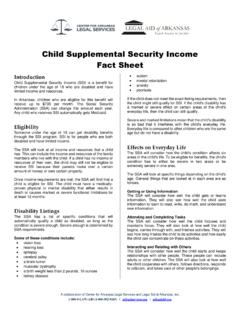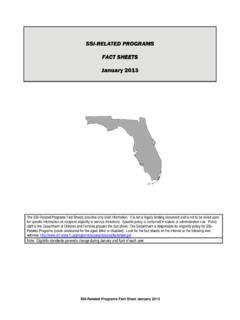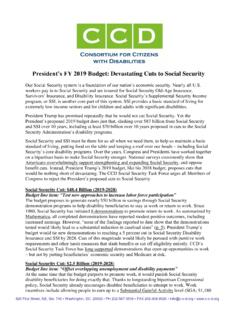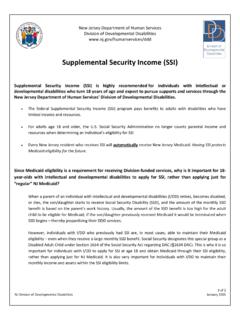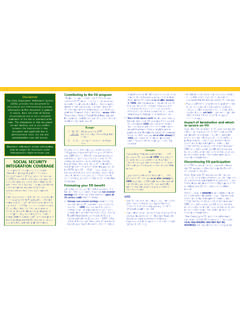Transcription of Overpayment of Social Security Benefits
1 Overpayment of Social Security Benefits and the Role of Employment Networks Overpayment of Social Security Benefits overpayments occur when beneficiaries receive monthly benefit checks they were not entitled to receive, or monthly checks that are larger than they were entitled to receive. Unfortunately, overpayments are very common for recipients of Social Security disability Benefits who go to work. The most common reasons for overpayments are: Social Security Disability Income (SSDI) Benefits ceasing because of the program s work-related rules; SSDI Benefits ceasing because of the person s medical improvement; Supplemental Security Income (SSI) recipients having excess resources; and SSI recipients having excess earnings. Many factors contribute to the frequency of overpayments , including: Social Security s rules governing the impact of work and earnings are complex.
2 The rules differ depending on whether a person is receiving SSDI, SSI or both. Individuals receiving both types of Benefits are referred to as concurrent beneficiaries. Multiple factors such as changes in earned income, assets, or even marital status can affect eligibility for, or the amount of, a person s monthly SSI benefit. Beneficiaries often fail to report their earnings to Social Security . Work backlogs for Social Security claims representatives often result in delayed processing of reported earnings. How can Employment Networks (ENs) assist Ticketholders with overpayments ? One of the most valuable services ENs can offer to working beneficiaries is to help them understand their responsibility to report their earnings to Social Security in a timely manner to avoid overpayments . ENs can help beneficiaries who have received Overpayment notices by continuing to support their work efforts while they attempt to resolve the overpayments .
3 Such support may prevent them from becoming so frustrated that they stop working. ENs can also help beneficiaries understand the options for appeal when a beneficiary believes an Overpayment was assessed incorrectly. Overpayment of Social Security Benefits and the Role of Employment Networks 2 ENs that lack the capacity to provide expert assistance and guidance in managing overpayments should identify external resources and assist beneficiaries to contact them, or make referrals to programs with such expertise. ENs can help beneficiaries by: Encouraging beneficiaries to report their earnings in a timely manner: Encourage all beneficiaries who are self-employed to file their income taxes by April 15 and familiarizing beneficiaries who are self-employed with pertinent tax forms ( Form 1040, Schedule C, Schedule F, and Schedule SE).
4 Strongly encourage beneficiaries to report their earnings directly to their claims representatives and to request written documentation of their earnings as reported each month. Concurrent beneficiaries should report their earnings to the claims representatives for each entitlement program. If a beneficiary thinks he/she should no longer get monthly Benefits , the beneficiary may want to simply keep all future checks or deposit them into a separate bank account to collect interest until it is clear whether or not Benefits should have been suspended. SSI recipients and those with Medicaid coverage may want to consult with a Benefits planner before depositing these checks to ensure that these funds will not be counted towards the resource limit applicable to eligibility for these programs.
5 Encouraging beneficiaries receiving SSI to report their earnings through the Supplemental Security Income Telephone Wage Reporting (SSITWR) method or SSI Mobile Wage Reporting (SSIMWR) application: The SSITWR method is a toll-free automated system that allows certain beneficiaries, their spouses, parents and representative payees to report the total gross monthly wages for the prior month to SSA over the telephone. The SSIMWR application allows reporting of the total gross monthly wages for the prior month using a mobile device. Wage reporters can download and install the free SSIMWR application on an Apple or Android mobile device. Only certain individuals can report monthly wages using SSITWR or SSIMWR. Please contact your local Social Security office to see which wage reporting option is best for you.
6 If SSITWR or SSIMWR is an option for you, the office will provide you with worksheets and informational instructions for how to report wages using either of these methods. Assisting beneficiaries to understand and use Social Security s Work Incentives: Work Incentives are rules/tools that beneficiaries can use to reduce their countable earned income. See the Social Security Red Book at , or visit the Choose Work website at and click on Webinars and Tutorials for details. Overpayment of Social Security Benefits and the Role of Employment Networks 3 Work Incentive Planning and Assistance (WIPA) projects are community-based organizations that work to enable beneficiaries with disabilities to make informed choices about work, and to support working beneficiaries to make a successful transition to financial independence.
7 Each WIPA project has a Community Work Incentives Coordinator who will work with beneficiaries one-on-one to provide in-depth counseling about Benefits and the effect of work on those Benefits . Click here to find the WIPA project near you. Helping beneficiaries understand their options when an Overpayment occurs: Requesting reconsideration of Social Security s Overpayment decision, if the beneficiary believes he/she was not overpaid ( , by filing Form SSA 561 or sending a letter to Social Security within 60 days of receipt of the Overpayment notice); Requesting that Social Security give the beneficiary permission to pay back the amount at a different rate ( , by filing Form SSA 632); or Requesting that Social Security waive (agree not to collect) the Overpayment ( , by filing Form SSA 632).
8 Social Security s explanation of these options and the forms that must be filed for each option can be found at Additional resources For information specific to SSI recipients, access Understanding Supplemental Security Income overpayments (2013 Edition) at Learn more about reporting wages when receiving SSI: Find the Work Insurance Planning and Assistance (WIPA) project serving your area by clicking on the Find Help tool. Contact the Ticket to Work Help Line at or (TTY) if you need more help locating a WIPA program in your area, or to discuss Social Security work incentives or other employment support programs.




